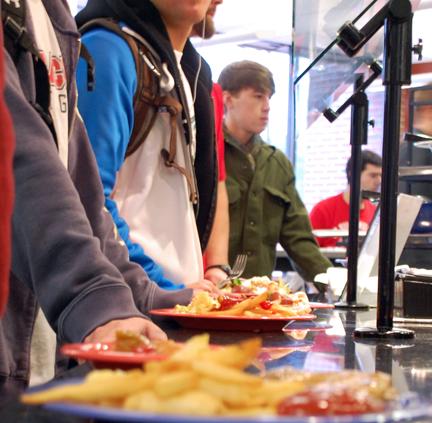Going green at University Dining halls doesn’t just mean hitting up the salad bar anymore. Dining services staff are making strides in a sustainability effort that affects the way students eat.
“We served 400,000 meals at Fountain this fall,” Director of Dining Services Randy Lait said.
Each meal served is part of the dining sustainability plan, which includes removing all trays from dining halls, buying local food when possible and having used cooking oil collected for biofuel.
Sustainability is an environmental concept that involves conservation and waste reduction in an effort to reduce or eliminate the depletion of resources. In other words, it’s a management effort that strives to maintain the environment for future use. University Dining’s sustainability initiative is producing a cornucopia of benefits, from reducing waste to saving money.
Going trayless is one such initiative.
Students like Michael Green, junior in parks, recreation and tourism management, said they were surprised at first to see there were no trays to carry food to their tables.
“In the beginning, it was a hassle not having the trays,” Green said. “But in the end, I guess you don’t really need them.”
Going trayless saves the dining hall 51,000 gallons of water a week, and Lait reports a reduction in food wastes because students are not able to pile their trays high with food they are not going to eat.
“We have seen savings in food wastes, and reduction in waste disposal costs overall,” Lait said of the initiative.
Another effort in sustainability is the collection of dining hall oil for biofuel.
“University Dining’s used cooking oil is picked up twice a month by Piedmont Bio-Fuels, which processes it into biodiesel that the company sells on the open market,” Lait said.
In the first two months of tracking, 5,288 pounds of oil were collected for recycling. Before making this switch, Lait said the University paid a company hundreds of dollars to dispose of the oil. Now, Piedmont Bio-Fuels picks up the waste for free.
Buying local produce is another valuable approach to reducing environmental impact, and Lait said University Dining buys regional food whenever possible.
“We use North Carolina products wherever we can, and this is normally pretty easy to do,” Lait said. “For example, we use North Carolina strawberries in April and May [when they’re in season] . . . The milk and ice cream come directly from NCSU farms and the campus dairy plant.”
Once a year, Fountain Dining Hall features the “All Carolinas Meal,” which consists entirely of North Carolina products.
In addition to conserving resources and reducing waste, Wolfpack dining halls are helping to make the world a cleaner place.
“I feel like I’m doing something good for the world just by eating there,” Green said, “and if I’m accomplishing something good just by eating some food, then I’m getting a pretty good deal.”








